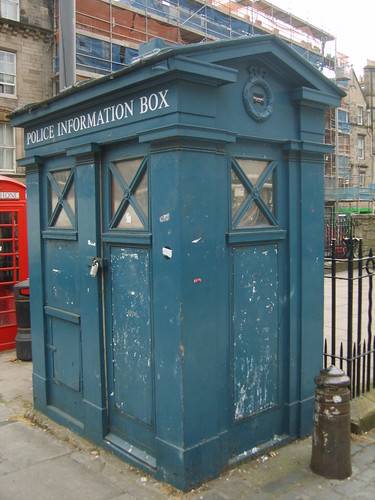
It is, of course, a TARDIS, a time machine used by Dr Who. He can go to any point in the universe, at any point in time, where he meets with people from history and fights against the aliens. I wasn't sure how many of you would recognise this, but it seems that lots of you watched Dr Who on Saturday nights.
If you could go back in a time machine, what would you do? What would you want to see happening? If you could be there to see something in the Bible, what would you choose? It might be David fighting Goliath, or maybe Jesus feeding the 5000 people. Lots of possibilities.
What about going to see the first church? You might be asking yourself what it looked like; what they did; who were they? The thing is, we don't need a TARDIS and Dr Who to see the first church, we just need our Bible reading today, and Dr Luke, who wrote it for us.
Luke writes down what it was like on the first day of the church. It was the Day of Pentecost in Jerusalem. That morning, there were 120 people who loved Jesus and were waiting for the promised Holy Spirit. By the end of the day, after Peter had preached, another 3000 people joined the church! But what were they doing?
The first thing that might have surprised you was - there was no church building. They didn't have a building like ours, where they gathered on a Sunday morning. Instead, they met in people's homes, and at the temple, just wherever they were.
Luke gives us four features of things the first church did, and I've got some pictures to help us see what they were.
1. They devoted themselves to the apostles' teaching... - who were the apostles? They were the men who had been with Jesus, who had heard him teach, had seen him do all those miracles, had met with him risen from the dead. Just think of it - if 3000 people who had never met Jesus needed to know about him, to get to know him, how would they do it? Those who had learnt from Jesus were teaching the others.
It's a bit like those of us who weren't alive during the second world war. How could we find out about it? We could ask the people who do remember it - perhaps even some who are in church this morning. These days we don't have any apostles around - they would be even older than the people who can remember the second world war! So how can we be sure that we're learning what the apostles taught?
Even though we don't have the apostles themselves, we still have their teaching - they wrote it down in what is the New Testament - the story of Jesus, and the apostles, and letters to new churches and Christians. So when we open the Bible, we are hearing what the apostles teach, because it is what God is speaking.
2. ... and the fellowship... - Fellowship might not be a word we use very much. It might be a word you only hear in church, one of the big words you hear of in church but don't know what it means. But think for a moment - if you have lots of new Christians, and they don't know how to be Christians, so they're hearing the apostles teaching, then how else can they be helped to live as Christians?
It's by partnership (another word for fellowship!), coming together, meeting together to support and encourage each other in their faith. The church family spends time together.
It's illustrated by the Lord of the Rings - which none of you may have seen. In the first book or movie of three (very long books and movies they are too...), nine creatures set off on a mission together, and they are the Fellowship of the Ring. They come together, help each other, in order to complete the mission and destroy the ring to defeat the evil power. We're on a mission too, as we want to tell people about Jesus, and we need each other for help and support and encouragement.
3. ... the breaking of bread... - when do we break bread in church? It's at the Communion service, isn't it? We break bread to remember Jesus, his death and resurrection - it's the reason there's a church at all. As we break bread we share together - something we see the church doing as they cared for each other and helped those in need.
4. ... and prayer - remember that as they do all this together, as they seek to learn from God and remember Jesus' sacrifice and support each other, we can't do it alone. We need the power and help of God, asking God to help us.
So as the church did these four things - four things that we still do today - they cared for the needy, shared what they had, praised God, and every day, more people joined them, as the Lord added daily to their number those who were being saved.
What about us? We have the same four features of church life, will we change the world? Are we committed to church, to helping each other do just that? Let's pray.
This sermon was preached at the Family Service in Aghavea Parish Church on Sunday 16th October 2011
amazing post! u've done really excellent job!! thanks a lot for sharing with us.
ReplyDelete